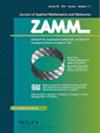Dissipative Lorentz force influence on mass flow over a micro‐cantilever sensor sheet under magnetic Ohmic heating
IF 3.2
4区 工程技术
Q1 MATHEMATICS, APPLIED
Zamm-zeitschrift Fur Angewandte Mathematik Und Mechanik
Pub Date : 2023-09-12
DOI:10.1002/zamm.202300055
引用次数: 0
Abstract
Abstract The novelty and main aim of the present numerical analysis is to explore the magneto‐thermo‐fluid characteristic features of incompressible, time‐dependent electrically conducting second‐grade fluid flow about a micro‐cantilever sensor sheet suspended in a squeezed regime between two parallel plates under the influence of Lorentz force field and viscous dissipation effects. Pertaining to this physical situation, the primitive forms of produced coupled nonlinear partial differential equations are rendered to non‐dimensional ordinary differential equations through appropriate scaling transformations. The resultant coupled nonlinear boundary value physical problem is solved by deploying a robust BVP4C Matlab function. The key features of the emerged different fluid flow parameters are documented in terms of extensive graphical visualization and tabular discussion. The current numerical investigation showed that, the increasing second‐grade fluid parameter significantly decreases the flow field and enhances the thermal and mass diffusion fields. Magnifying permeable velocity number decreases the velocity and increases the heat and concentration transport process. The thermal distribution over a sensor region is boosted with increasing Eckert number through viscous dissipation and magnetic Ohmic heating. Further, the elevating squeezing number decreases the skin friction and enhancing second‐grade fluid number boosted the skin‐friction coefficient. In addition to this, the increasing Schmidt and squeezing parameters decreases the local Sherwood number. Finally, a reasonable agreement between the present numerical solutions with the former results is presented.磁欧姆加热下耗散洛伦兹力对微悬臂梁传感器片上质量流动的影响
摘要本数值分析的新颖性和主要目的是探讨在洛伦兹力场和粘性耗散效应的影响下,悬浮在两个平行板之间的挤压状态下的微悬臂传感器片的不可压缩、时间相关的导电二级流体的磁热流体特性。针对这种物理情况,所生成的耦合非线性偏微分方程的原始形式通过适当的缩放变换转化为无维常微分方程。通过部署鲁棒的BVP4C Matlab函数,解决了由此产生的耦合非线性边值物理问题。所出现的不同流体流动参数的关键特征以广泛的图形可视化和表格讨论的方式记录下来。目前的数值研究表明,增大的二级流体参数显著减小了流场,增强了热扩散场和质量扩散场。增大渗透速度数降低了流速,增加了热浓输运过程。通过粘性耗散和磁欧姆加热,随着埃克特数的增加,传感器区域的热分布得到增强。挤压次数的增加使摩擦系数减小,二级流体次数的增加使摩擦系数增大。此外,增大的施密特参数和压缩参数使局部舍伍德数减小。最后,给出了数值解与原结果的合理吻合。
本文章由计算机程序翻译,如有差异,请以英文原文为准。
求助全文
约1分钟内获得全文
求助全文
来源期刊
CiteScore
3.30
自引率
8.70%
发文量
199
审稿时长
3.0 months
期刊介绍:
ZAMM is one of the oldest journals in the field of applied mathematics and mechanics and is read by scientists all over the world. The aim and scope of ZAMM is the publication of new results and review articles and information on applied mathematics (mainly numerical mathematics and various applications of analysis, in particular numerical aspects of differential and integral equations), on the entire field of theoretical and applied mechanics (solid mechanics, fluid mechanics, thermodynamics). ZAMM is also open to essential contributions on mathematics in industrial applications.

 求助内容:
求助内容: 应助结果提醒方式:
应助结果提醒方式:


